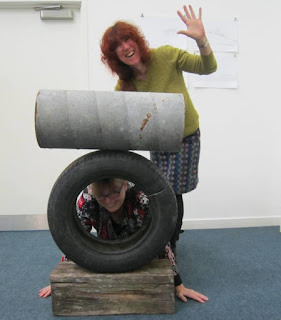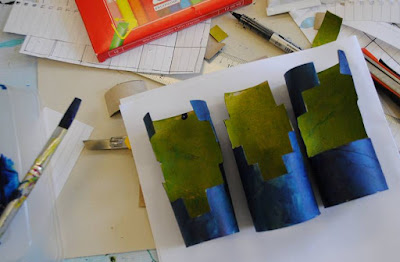Boxing Shadows is an exhibition of over 30 artists made up of sculpture, paintings, drawings, films and ceramics in parallel with artist Stephen Park's Residency Exhibition at Celf o Gwmpas in Llandrindod Wells. It is on until 5 January 2017, and last week I attended a panel discussion and artist talks as part of the second annual Welsh Mental Health Arts Festival. Other activities scheduled at Celf as part of the week long event in partnership with Disability Arts Cymru and Making Minds 'WALLS: MURIAU' included a Comedy Evening and a drop-in workshop with new arts group Celf-Able.
 |
| Jane Cooke from our team with sculpture by Geraint Edwards |
The panel discussion provided a great opportunity for a more in depth discussion around arts and mental health. It was attended by individuals, artists, voluntary organisations and professionals engaged in both the art and mental health sectors.
Stephen Park, a graduate of Goldsmiths College and the Slade School in London, was first up to speak. He told us that for 10 years he had been a
mental health support worker, and for 15 years he was on the periphery of the art
world working in art colleges. This was the first time, however, that he had spoken to both sectors "in one sentence".
He said that in mental health there is the perception that there are lots of different approaches, probably conflicting. "It is a mix-and-match approach to help you. It is the same in art college – people are trying to become themselves and flourish. There are lots of confusing approaches."
Stephen does not feel he belongs to the art establishment – the academic world of art colleges, museums, and critical thinking. He feels the same about mental health. Institutions such as hospitals and charities have their own agenda that does not quite correspond to the internal experience of the person in it with mental health difficulties. Or the novice artist trying to find/identify a way of working.
He said that in mental health there is the idea that art is good for you. Yet staff have no understanding whatsoever what art is. "Art is terribly important. You should do it even if it is bad for you. For artists the worst eventuality is to become a zombie – doing everything to tick a box.... pay a mortgage... Artists see this and are frightened of it".
Stephen explained that he was invited by Celf o Gwmpas to run a workshop with a mental health angle. He did not take the angle of mental illness – he does not have the language for that. He can, however, understand confusion and distress. So he designed a course – having spoken to hundreds of creative people – that is one size fits all.
"If you have a creative impulse it is an infinite space which is very daunting. You need a compass and confidence and faith in what you have done. You don’t rely on other people too much".
 |
| Artist-in-Residence Stephen Park |
Stephen does not feel he belongs to the art establishment – the academic world of art colleges, museums, and critical thinking. He feels the same about mental health. Institutions such as hospitals and charities have their own agenda that does not quite correspond to the internal experience of the person in it with mental health difficulties. Or the novice artist trying to find/identify a way of working.
He said that in mental health there is the idea that art is good for you. Yet staff have no understanding whatsoever what art is. "Art is terribly important. You should do it even if it is bad for you. For artists the worst eventuality is to become a zombie – doing everything to tick a box.... pay a mortgage... Artists see this and are frightened of it".
Stephen explained that he was invited by Celf o Gwmpas to run a workshop with a mental health angle. He did not take the angle of mental illness – he does not have the language for that. He can, however, understand confusion and distress. So he designed a course – having spoken to hundreds of creative people – that is one size fits all.
"If you have a creative impulse it is an infinite space which is very daunting. You need a compass and confidence and faith in what you have done. You don’t rely on other people too much".
Much lively debate ensued. Some of the points raised included:
- There is always a focus on being positive. Society has an obsession with being happy all the time and there is something wrong with you if you have negative feelings. We should be allowed to be sad.
- An acknowledgement of the beauty of this project – it took people as they are and let them express their feelings in art if they wanted to – or not.
- The job of the artist is to ask questions.
- The job is to make something that was not there before. It might be questioned.
“Words are weapons and I’m in a war. The war hasn’t stopped.” Andrew Vachss
 |
| Artist and poet Sean Burns, with Rachel Dunlop on his right |
He spoke about Gwyneth Lewis's book "Sunbathing in the Rain" – a cheerful book about depression. “The cure for depression is the truth… It teaches you slowly to live better.”
Sean read "Gob Squad Arriving" – a poem he wrote after going to his first punk gig in 1981 in Brecon against his psychiatrist’s orders. “Learn to love your madnesses.”
 |
| Celf-Able - a new art group |
The debate continued - and there was much lively discussion about the values (or not) of receiving funding to pursue artistic aims, whether as an individual or an organisation.
Stephen said that "Art and creativity is not something done by experts elsewhere. It’s done here and now. You dive in. Participate. Resourcefulness is a prime quality for artists. We can either say – they won’t let me in – and just sit there. Or we can do it ourselves. You will feel vulnerable, exposed.... scared even. But it has to be that way. That’s how you become strong and find your voice and participate. Art will always surface regardless of funding. People will use what they have in the time available."
 |
| Jane and Jackie: PAVO mental health team |
Jane Cooke attended the panel with three hats on – as the Mental Health Senior Officer at PAVO, as a counsellor, and as a trustee of Celf o Gwmpas.
She spoke about the work of the PAVO mental health team, and involvement on various boards and partnerships. "When the words mental health are used, people are not referring to feeling great about yourself, "that was terrific, fantastic…" Rather it’s another way of saying mental illness".
"Health is a good thing. The language of mental health is of illness… disorders… conditions. It’s not the truth, it’s a construct. A lot of intelligent people are now challenging that." She likes to think what it would be like to create a project for “well-ordered” people. Jane encouraged us not to use the language of mental illness when writing funding bids or reports.
She concluded by saying that "projects like Boxing Shadows help people to get beyond their internal difficulties and barriers – so there is a real value to getting funding. It gets people to a place they wouldn’t have done without it".
She concluded by saying that "projects like Boxing Shadows help people to get beyond their internal difficulties and barriers – so there is a real value to getting funding. It gets people to a place they wouldn’t have done without it".








